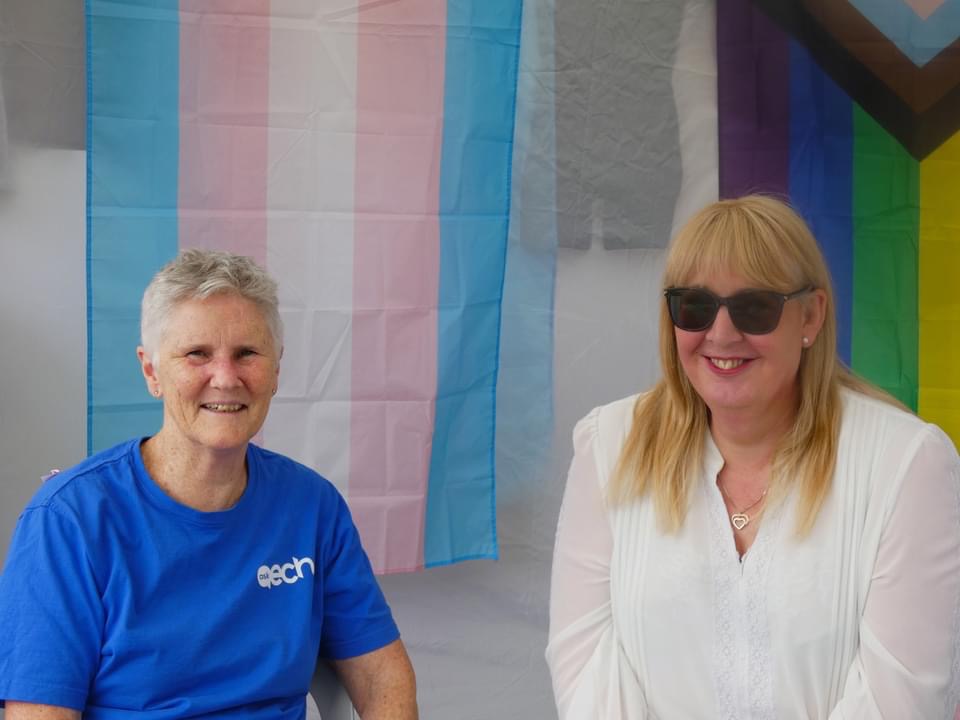Jessica is pictured on the right here with fellow Committee Member Pam Price at our recent Picnic stall. Photo: Janiece Pope.
By Jessica Jayne Evans, Rainbow Hub SA Committee Member.
In South Australia we are seeing a growing understanding and acceptance of trans people, in society, particularly for young people and emerging adults, but for trans individuals aged 50+ there still exists many obstacles and barriers that are impacting the / our quality of living, and sense of social acceptance.
By understanding a little about the issues faced by older trans people we are all able to play a part in helping change the narrative and through celebrating differences make a positive change in peoples’ lives – we can become trans allies.
Before we look at how people can help, it is important to understand the terms being used and educate ourselves.
So what does the term trans actually mean? Being trans means different things to different people. ‘Trans’ generally refers to someone who lives their life as a gender different from that listed at the time of their birth. While some trans people maintain the label or identity ‘trans’ throughout their life, others simply consider themselves men or women. Just with all other groups, trans is not a homogenous group; there are many different ways of being trans.
‘Gender transition’ also means different things to different people. For some, it means changing their name and informing people of their gender identity and preference to be described using the pronouns of that gender (‘she’, ‘he’ or ‘they’). For others it means years of surgeries and a lifelong commitment to hormone therapies. Not all trans people, however, pursue such medical interventions to change their appearance for a variety of reasons, including individual preference, medical reasons, financial impossibility and other barriers.
Who and what exactly is a trans ally? A trans ally is a cisgender (non-trans) person, who is committed to being open minded, respectful, and supportive of transgender and gender diverse people.
A good ally will take the time to learn about trans people, challenge transphobia, assumptions and stereotypes, and through their own actions help to ensure trans people are treated with respect. Every non-trans person can be an ally.
What is transphobia? The core value underlying all transphobia is a rejection of trans identity and a refusal to acknowledge that it could possibly be real or valid. Transphobia has no single, simple manifestation. It is complex and can include a range of behaviours and arguments. The consequence of transphobia is that trans people struggle to live openly and comfortably in society. An ultimate outcome may be the erasure of trans people.
Transphobia includes, but is not limited to:
• Attempting to remove trans people’s rights
• Misrepresenting trans people
• Abuse
• Systematically excluding trans people from discussions about issues that directly affect them
• Other forms of discrimination.
Issues experienced by older trans Australians
Studies into the welfare of older trans Australian people are few and far between, but with the little research that has been conducted we can see that there are a range of barriers, and obstacles that are highly impactful on their lives.
Some of the issues facing older Australian trans people include:
- Depression
- Anxiety
- Fear
- Social discrimination
- Social isolation, including lack of community groups
- Employment and workplace discrimination, resulting in financial disadvantage
- Discrimination in relation to housing.
There is an absolute fear for many older trans people of entering residential aged care, where they find themselves facing:
- Documentation issues
- Staff lacking education regarding health and physical needs
- Binary segregation of male and female and gender-exclusive activities that can leave trans people feeling ostracised
- Limited access to social groups of like-minded individuals.
All told it can feel overwhelming and a constant fight on all fronts, but help is at hand and it’s in the form of You !!
How you can be a trans ally
So, you have gained an understanding of how a marginalised section of society needs your love and support, but how do you ensure your best placed efforts and intentions are effective?
Below are several ways you can demonstrate your support and help make a difference. This guide is aimed at identifying things we need to consider, actions we can take, and a few things we need to avoid.
Things to Consider
Continue to educate yourself. One of the simplest ways to be a strong ally is to take your education into your own hands. It’s important to have conversations with the trans people in your life, but it’s also important for you to seek out resources and information on your own. A few great places to start:
Use the language a trans person uses for themselves. No two trans people are exactly the same, and different people may use different words to describe themselves. You should follow the lead of each trans person, as they will best know the language that is right for them.
If you don’t know what pronouns to use, ask. A simple way to see what pronouns someone uses—he, she, they, or something else—is to wait and see if it comes up naturally in conversation. If you’re still unsure, ask politely and respectfully, without making a big deal about it. Sharing your own pronouns is a great way to bring up the topic—for example, “Hi, I’m Jessica and I use she/her/hers as my pronouns. How about you?” If you accidentally use the wrong pronouns, apologise and move on. Making a big deal out of a pronoun mistake may be awkward and often draws unwanted attention to the trans person.
Actions speak louder than words
Speak out in support of trans people and trans rights. Politely correct others if they use the wrong name or pronoun for a trans person. More broadly, it is important to challenge anti-trans remarks and jokes. It can be scary to speak out, but loud and visible support for trans rights can show trans people that they are accepted, encourage other allies to speak out, and help change the minds of people who aren’t yet supportive of trans people.
Support trans people who experience discrimination. Trans people may feel that they don’t have support from others when making complaints about discrimination or bringing their experiences to authorities, administrators, or others in positions of power. Make it clear that you will support the trans people in your life whether or not they decide to make formal complaints.
Think about how you use gendered language. Do you regularly greet groups by saying, “Ladies and gentlemen?” Do you have a friend who refers to everyone as “guys?” Is there a particular gender-based joke your friend loves to tell? Many trans people are fine being called ‘ladies’ or ‘gentlemen,’ but you can’t know without first asking. Consider changing your habits to avoid making assumptions about people’s gender or pronouns, and encouraging others in your life to do the same. This can take time and effort, but is an important way to be an ally and support trans people outside of individual, face-to-face interactions.
Be careful and considerate about what other questions you ask. There are many topics—medical transition, life pre-transition, sexual activity—that you may be curious about. That doesn’t mean it’s appropriate to ask a trans person about them, or expect a trans person to be comfortable sharing intimate details about themselves. There are two questions you can ask yourself that may help determine if a topic is appropriate to bring up:
“Do I need to know this information to treat them respectfully?” Asking someone’s name and pronoun is almost always appropriate, as we use that information in talking to and about each other every day. Beyond that, though, you may be curious about questions that are not things you need to know. For example, a trans coworker’s surgical history.
“Would I be comfortable if this question was turned around and asked of me?” For example, it would probably not feel appropriate for a coworker to ask you about private areas of your body.
Here are some specific topics that many trans people are uncomfortable discussing with anyone but those closest to them:
- Their birth name (never call it their “real” name!) or photographs from before they transitioned
- What hormones they are (or aren’t) taking
- What surgeries they have (or have not) had
- Questions related to sexual relationships.
Being considerate in our approach and understanding our limitations
You don’t have to understand someone’s identity to respect it. Some people haven’t heard a lot about trans identity, or have trouble understanding what it means to be trans, and that’s okay. But all people, even those whose identities you don’t fully understand, deserve respect.
You can’t always tell if someone is trans simply by looking at them. Many people expect that they’ll ‘just know’ when someone is trans, and may be surprised to learn that this isn’t always true. Since there is no one trans experience, there is no one way for trans people to look, either. Trans people might be in groups or gatherings alongside you without you realising– which makes it even more important to be an outspoken ally and supporter, whether or not you are aware of any trans people around you.
There is no one ‘right way’ to be trans. Some trans people choose to medically transition, and some don’t. Some trans people choose to legally change their names or ID documents, and some don’t. Some trans people choose to change their appearance (like their clothing or hair), and some don’t. Likewise, some trans people may want to do many of those things but are unable to because they can’t afford it or for safety reasons. A trans person’s identity does not depend on what things they have or haven’t done to transition, and no two trans peoples’ journeys are exactly alike.
Challenge transphobia If you hear transphobic language or jokes, call them out. If you hear someone misgendering a trans or non-binary person, correct them and make sure they know what the right words to use are.It is exhausting and distressing for trans and non-binary people to keep correcting those who misgender them repeatedly and to deal with transphobia in everyday life and in the media. Use your privilege to make others listen to you and educate them.
Realise that transphobic comments can come from people who are anti-LGBTI+, but they can also come from people who are LGBTI+. It’s important to challenge anti-trans remarks or jokes no matter who says them.
There is no one way to be a ‘perfect’ ally. The trans community is diverse and complex, coming from every state in Australia and around the world, from every racial and ethnic background, and from every faith community. This means that different members of the trans community have different needs and priorities. Similarly, there is no one right way to handle every situation, or interact with every trans person. Be respectful, do your best, and keep trying, we do really appreciate it.

